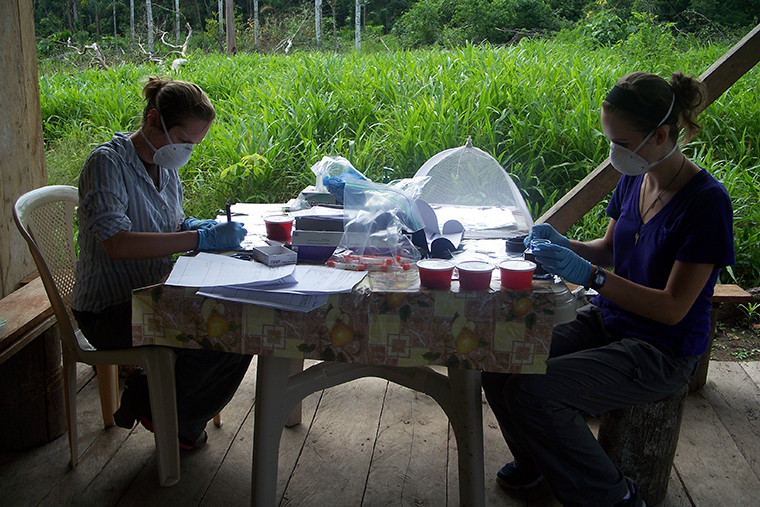The next time your stomach turns at the smell of spoiled food or the sight of feces, pay attention. New research, published in the Proceedings of the National Academy of Sciences on Feb. 15, suggests that disgust could be the body’s way of helping people avoid infection — giving new meaning to the phrase “trust your gut.”
The study is the first in its field to directly test whether people who experience a greater pathogen disgust sensitivity — that is, people who are more sensitive to feeling disgust — will become exposed to fewer pathogens in their local environments, and thus suffer fewer infections, according to Theresa E. Gildner, assistant professor of biological anthropology in Arts & Sciences at Washington University in St. Louis and study co-author.
Researchers tested whether a self-reported individual level of disgust in response to likely sources of infection was associated with signs of infection in three indigenous Ecuadorian Shuar communities. The communities were all located in high-pathogen environments, but with differing levels of economic development and participation in activities such as hunting.

“We found that participants who exhibited higher levels of disgust had lower levels of biomarkers associated with immune responses to viral or bacterial infection, suggesting that disgust may be protective against disease as hypothesized,” Gildner said.
However, the association between disgust and infection also appears to be influenced by local conditions.
“Participants living in areas where exposure to pathogens is common in everyday activities — such as collecting food or water — couldn’t afford to have high disgust levels. In comparison, individuals living in communities with higher economic development, where it’s easier to avoid sources of possible infection, appear to exhibit greater disgust sensitivity,” Gildner said.
“One example of this that many people may relate to is the experience of camping. Feelings of disgust may decrease while camping because it can be much harder to maintain the same level of cleanliness as when you’re at home.”
“One example of this that many people may relate to is the experience of camping. Feelings of disgust may decrease while camping because it can be much harder to maintain the same level of cleanliness as when you’re at home.”
Theresa Gildner
The findings support the hypothesis that disgust evolved as an emotion that helps people to avoid disease exposure. Interestingly, there also appears to be a cultural component as some aspects of disgust vary across contexts.
“For example, many groups — including the Shuar participants in this study — incorporate insects into their diets and don’t find this disgusting. But many Americans might be disgusted by the thought of eating an insect. So, while some things, such as feces, appear to elicit feelings of disgust across most people, other stimuli appear to vary by cultural norms and living conditions,” Gildner said.
Unfortunately, there are limits to what feelings of disgust can and can’t do. For example, the feeling is unlikely to help during a pandemic, including the ongoing COVID-19 global issue.
“The current pandemic is an interesting case because so much of the spread seems to be through asymptomatic cases,” Gildner said. “This means there are often no obvious signs of infection to trigger feelings of disgust and help people to avoid potential carriers of the virus.
“However, in many instances we also see an increased awareness of pathogen avoidance behaviors, including handwashing and sanitizing surfaces, although this may be contingent on living conditions — for example, having access to clean water and soap.”

The study was conducted as part of the Shuar Health and Life History Project and includes researchers from the University of Colorado Colorado Springs, Washington State University, Washington University in St. Louis, Northern Arizona University, Baylor University, University of Oregon and Queens College, City University of New York.
The research team intends to continue exploring disgust in relation to health outcomes.
“We plan to explore how disgust sensitivity may change with age among the Shuar, especially if living conditions and exposure to likely sources of infection change within an individual’s lifespan,” Gildner said. “We’re also interested in expanding beyond measures of infection to investigate how disgust sensitivity may impact other factors associated with human health, including microbiome composition, which is the bacteria living in the human gut that help us to break down food and appears to impact immune activity.”


